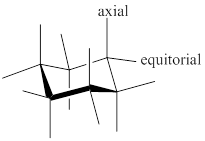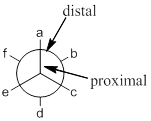
Organic Chemistry
3rd Edition
ISBN: 9781119338352
Author: Klein
Publisher: WILEY
expand_more
expand_more
format_list_bulleted
Question
Chapter 4, Problem 68IP
(a)
Interpretation Introduction
Interpretation:
Most stable conformer should be found between the given two chair conformations.
Concept introduction:
- Chair conformer: chair conformer is a stable conformer for cyclohexane compound. In this chair conformer two positions are important for substitutions one is equatorial and other one axial position. Axial positions are parallel to the axis of ring while equatorial positions are perpendicular to the axis of the ring.
Example:

- Newman projection: Newman projection of molecule is one type of representations for the
alkanes , where the projection visualization from one carbon to another carbon. In this Newman projection, front carbon which represented with dot is called proximal and the back carbon which represented with circle is called distal.
The most stable conformation in the Newman projection is the one which has least steric hindrance among all conformations.
(b)
Interpretation Introduction
Interpretation:
The isomer is needed to be found which cannot perform ring flip.
Concept introduction:
- Chair conformer: chair conformer is a stable conformer for cyclohexane compound. In this chair conformer two positions are important for substitutions one is equatorial and other one axial position. Axial positions are parallel to the axis of ring while equatorial positions are perpendicular to the axis of the ring.
Example:

- Newman projection: Newman projection of molecule is one type of representations for the alkanes, where the projection visualization from one carbon to another carbon. In this Newman projection, front carbon which represented with dot is called proximal and the back carbon which represented with circle is called distal.

The most stable conformation in the Newman projection is the one which has least steric hindrance among all conformations.
Expert Solution & Answer
Want to see the full answer?
Check out a sample textbook solution
Students have asked these similar questions
What is the product of the reaction?
F3C.
CF3
OMe
NaOH / H₂O
What is the product of the reaction?
F3C.
CF3
OMe
NaOH / H₂O
What would you expect to be the major product obtained from the following reaction? Please explain what is happening here. Provide a detailed explanation and a drawing showing how the reaction occurs. The correct answer to this question is V.
Chapter 4 Solutions
Organic Chemistry
Ch. 4.2 - Prob. 1LTSCh. 4.2 - Prob. 1PTSCh. 4.2 - Prob. 2PTSCh. 4.2 - Prob. 3ATSCh. 4.2 - Prob. 2LTSCh. 4.2 - Prob. 4PTSCh. 4.2 - Prob. 5ATSCh. 4.2 - Prob. 3LTSCh. 4.2 - Prob. 6PTSCh. 4.2 - Prob. 7ATS
Ch. 4.2 - Prob. 4LTSCh. 4.2 - Prob. 8PTSCh. 4.2 - Prob. 9PTSCh. 4.2 - Prob. 10ATSCh. 4.2 - Prob. 5LTSCh. 4.2 - Prob. 11PTSCh. 4.2 - Prob. 12PTSCh. 4.2 - Prob. 13ATSCh. 4.3 - Prob. 6LTSCh. 4.3 - Prob. 14PTSCh. 4.3 - Prob. 15ATSCh. 4.6 - Prob. 7LTSCh. 4.6 - Prob. 16PTSCh. 4.6 - Prob. 17ATSCh. 4.7 - Prob. 18CCCh. 4.8 - Prob. 8LTSCh. 4.8 - Prob. 19PTSCh. 4.8 - Prob. 20ATSCh. 4.11 - Prob. 9LTSCh. 4.11 - Prob. 21PTSCh. 4.11 - Prob. 22ATSCh. 4.11 - Prob. 10LTSCh. 4.11 - Prob. 23PTSCh. 4.11 - Prob. 24ATSCh. 4.12 - Prob. 11LTSCh. 4.12 - Prob. 25PTSCh. 4.12 - Prob. 26ATSCh. 4.12 - Prob. 27CCCh. 4.13 - Prob. 12LTSCh. 4.13 - Prob. 28PTSCh. 4.13 - Prob. 29ATSCh. 4.13 - Prob. 13LTSCh. 4.13 - Prob. 30PTSCh. 4.13 - Prob. 31ATSCh. 4.13 - Prob. 32ATSCh. 4.14 - Prob. 33CCCh. 4.14 - Prob. 34CCCh. 4.14 - Prob. 35CCCh. 4 - Prob. 36PPCh. 4 - Prob. 37PPCh. 4 - Prob. 38PPCh. 4 - Prob. 39PPCh. 4 - Prob. 40PPCh. 4 - Prob. 41PPCh. 4 - Prob. 42PPCh. 4 - Prob. 43PPCh. 4 - Prob. 44PPCh. 4 - Prob. 45PPCh. 4 - Prob. 46PPCh. 4 - Prob. 47PPCh. 4 - Prob. 48PPCh. 4 - Prob. 49PPCh. 4 - Prob. 50PPCh. 4 - Prob. 51PPCh. 4 - Prob. 52PPCh. 4 - Prob. 53PPCh. 4 - Prob. 54PPCh. 4 - Prob. 55PPCh. 4 - Prob. 56PPCh. 4 - Prob. 57PPCh. 4 - Prob. 58PPCh. 4 - Prob. 59PPCh. 4 - Prob. 60PPCh. 4 - Prob. 61IPCh. 4 - Prob. 62IPCh. 4 - Prob. 64IPCh. 4 - Prob. 65IPCh. 4 - Prob. 66IPCh. 4 - Prob. 67IPCh. 4 - Prob. 68IPCh. 4 - Prob. 69IPCh. 4 - Prob. 70IPCh. 4 -
All of the following are representations of...Ch. 4 - Prob. 72IPCh. 4 -
Which of the following is expected to have the...Ch. 4 - Prob. 74IPCh. 4 - Prob. 75CPCh. 4 -
The all-trans-1,2,3,4,5,6-hexaethylcyclohexane...Ch. 4 -
Compounds 1 and 2 were prepared, and the...
Knowledge Booster
Similar questions
- Please answer the question for the reactions, thank youarrow_forwardWhat is the product of the following reaction? Please include a detailed explanation of what is happening in this question. Include a drawing showing how the reagent is reacting with the catalyst to produce the correct product. The correct answer is IV.arrow_forwardPlease complete the reactions, thank youarrow_forward
- Consider the synthesis. What is compound Y? Please explain what is happening in this question. Provide a detailed explanation and a drawing to show how the compound Y creates the product. The correct answer is D.arrow_forwardWhat would be the major product of the following reaction? Please include a detailed explanation of what is happening in this question. Include steps and a drawing to show this reaction proceeds and how the final product is formed. The correct answer is B. I put answer D and I don't really understand what is going on in the question.arrow_forwardWhat is the product of the following reaction? Please explain what is happening in this question. Provide a detailed explanation and a drawing showing how the reagent is reacting with the catalysts to product the correct product. The correct answer is B.arrow_forward
- What is the missing intermediate 1 and the final product 2. Please include a detailed explanation explaining the steps of malonic ester synthesis. Please include drawings of the intermediate and how it occurs and how the final product is former.arrow_forwardWhat would be the reagents and conditions above and below the arrow that will complete the proposed acetoacetic ester synthesis? If it cannot be done efficiently, then I will choose that answer. There could be 2 or 4 reagents involved. Please provide a detailed explanation and drawings showing how it would proceed with the correct reagents.arrow_forwardFor benzene, the ∆H° of vaporization is 30.72 kJ/mol and the ∆S° of vaporization is 86.97 J/mol・K. At 1.00 atm and 228.0 K, what is the ∆G° of vaporization for benzene, in kJ/mol?arrow_forward
- The reaction Q(g) + R(g) → Z(l) is shown to be exothermic. Which of the following is true concerning the reaction. it is spontaneous only at High T, it is spontaneous at low T it is nonspontaneous at all T it is spontanrous at all T. it is non spontaneous only at low T.arrow_forwardThe reaction Q(g) + R(g) → Z(l) is shown to be exothermic. Which of the following is true concerning the reactionarrow_forwardWhich of the following has the largest standard molar entropy, S° (298.15 K) He H2 NaCl KBr Hgarrow_forward
arrow_back_ios
SEE MORE QUESTIONS
arrow_forward_ios
Recommended textbooks for you
 ChemistryChemistryISBN:9781305957404Author:Steven S. Zumdahl, Susan A. Zumdahl, Donald J. DeCostePublisher:Cengage Learning
ChemistryChemistryISBN:9781305957404Author:Steven S. Zumdahl, Susan A. Zumdahl, Donald J. DeCostePublisher:Cengage Learning ChemistryChemistryISBN:9781259911156Author:Raymond Chang Dr., Jason Overby ProfessorPublisher:McGraw-Hill Education
ChemistryChemistryISBN:9781259911156Author:Raymond Chang Dr., Jason Overby ProfessorPublisher:McGraw-Hill Education Principles of Instrumental AnalysisChemistryISBN:9781305577213Author:Douglas A. Skoog, F. James Holler, Stanley R. CrouchPublisher:Cengage Learning
Principles of Instrumental AnalysisChemistryISBN:9781305577213Author:Douglas A. Skoog, F. James Holler, Stanley R. CrouchPublisher:Cengage Learning Organic ChemistryChemistryISBN:9780078021558Author:Janice Gorzynski Smith Dr.Publisher:McGraw-Hill Education
Organic ChemistryChemistryISBN:9780078021558Author:Janice Gorzynski Smith Dr.Publisher:McGraw-Hill Education Chemistry: Principles and ReactionsChemistryISBN:9781305079373Author:William L. Masterton, Cecile N. HurleyPublisher:Cengage Learning
Chemistry: Principles and ReactionsChemistryISBN:9781305079373Author:William L. Masterton, Cecile N. HurleyPublisher:Cengage Learning Elementary Principles of Chemical Processes, Bind...ChemistryISBN:9781118431221Author:Richard M. Felder, Ronald W. Rousseau, Lisa G. BullardPublisher:WILEY
Elementary Principles of Chemical Processes, Bind...ChemistryISBN:9781118431221Author:Richard M. Felder, Ronald W. Rousseau, Lisa G. BullardPublisher:WILEY

Chemistry
Chemistry
ISBN:9781305957404
Author:Steven S. Zumdahl, Susan A. Zumdahl, Donald J. DeCoste
Publisher:Cengage Learning

Chemistry
Chemistry
ISBN:9781259911156
Author:Raymond Chang Dr., Jason Overby Professor
Publisher:McGraw-Hill Education

Principles of Instrumental Analysis
Chemistry
ISBN:9781305577213
Author:Douglas A. Skoog, F. James Holler, Stanley R. Crouch
Publisher:Cengage Learning

Organic Chemistry
Chemistry
ISBN:9780078021558
Author:Janice Gorzynski Smith Dr.
Publisher:McGraw-Hill Education

Chemistry: Principles and Reactions
Chemistry
ISBN:9781305079373
Author:William L. Masterton, Cecile N. Hurley
Publisher:Cengage Learning

Elementary Principles of Chemical Processes, Bind...
Chemistry
ISBN:9781118431221
Author:Richard M. Felder, Ronald W. Rousseau, Lisa G. Bullard
Publisher:WILEY